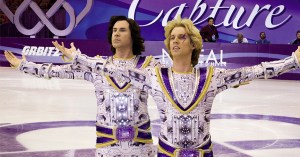Emotions Run High on Star Trek: Discovery — James Frain and Shazad Latif Explain Why
Spock’s daddy and the newest member of the Discovery crew have been swallowing their feelings.

Six episodes into Star Trek: Discovery, the crew is finally beginning to jell. But all is not well in the Trek universe; Sarek (James Frain), father of Spock and guardian of Michael Burnham (Sonequa Martin-Green), is in distress, setting off the events of episode 6, “Lethe,” of the CBS All Access series, which has just been renewed for a second season.
SPOILER ALERT: THIS ARTICLE INCLUDES PLOT DETAILS OF STAR TREK: DISCOVERY. TURN BACK NOW IF YOU HAVEN’T WATCHED THE SERIES’ SIXTH EPISODE.
Captain Lorca (Jason Isaacs) takes the latest addition to his lethal menagerie for a spin: Lt. Ash Tyler (Shazad Latif) bests the captain while shooting up a holodeck-generated Klingon threat during training.
After accepting the position of security chief from Lorca, Tyler goes to the mess hall and runs into Cadet Sylvia Tilly (Mary Wiseman) and Burnham, who doesn’t make it through her breakfast burrito before entering an altered state as Sarek mentally reaches out to her across vast distances of space.
Finding and retrieving her lost and critically wounded foster father becomes Burnham’s sole mission, and she brings Lorca, Tyler, Tilly, the rest of the Discovery crew, and even visiting Admiral Cornwell (Jayne Brook) on her journey.
This trek unleashes powerful memories in Sarek and feelings that will no doubt reverberate through the entire series.
We got an early peek at “Lethe” and spoke to Frain (recently seen as Theo Galavan in Gotham) and Latif (Dr. Jekyll in Penny Dreadful) about the different emotional journeys their respective characters are on and how much more great drama we can expect from them over the rest of the season.
James Frain | Shazad Latif
Spock’s Father Sarek Faces the Wrath of His Ward
|
(Photo by James Dimmock) |
Debbie Day for Rotten Tomatoes: Sarek is such an icon in the whole of the Star Trek franchise. How did you feel about taking on this character?
James Frain: I was really excited to be part of this. It’s been an incredible experience, and straightaway, I was like, “I would love to. Absolutely.” People ask me if I’m intimidated by the character in the original series. I’m not, really. I made a point of watching Mark Lenard’s performance, which I think is terrific. It is also very specific to its time. It’s the guy that Sarek ends up as. I thought it was really interesting to track back from that and go, “Well, how did he get there? What’s beneath all that?” We know that he’s married a human. What happened there? He married a human? That’s crazy. Do other Vulcans do that?”
We find out, in this episode, that he’s considered to be right outside the box. I mean, there are terrorists who’ve tried to kill Michael. Sarek saves her by giving her a piece of his soul, we find out in this episode. Then, there are terrorists trying to kill him, right now. That’s what happening. She’s in his mind, the martial arts, and the Vulcans, all that kind of stuff. In his memories. What’s happening is he’s dying from a suicide bomber. All that’s happening because he has this progressive idea of integration between humans and Vulcans, and also other species. He’s very much committed to that. All of those things, the writers have blown up the whole thing of, “Who was Sarek, and how did we get here?” We still, I feel like, we’re asking questions more than we’re giving answers, sometimes, because there’s so much to find out. It’s a lot of fun.
RT: Has it even been stated in Discovery yet that Sarek has been the ambassador to the humans, that that’s how Sarek has a human wife?
Frain: No. It’s been explicitly stated that he’s a high-ranking diplomat and ambassador, and therefore would be at the center of Starfleet and would be at the center of — just like the United Nations. He’s the UN ambassador, basically. There’s more to look at there. There’s so much story there to tell. These characters are so dynamic and fascinating. It’s so interesting how much more you can discover, the more you dig.
RT: Sarek is not the typical Vulcan, because he’s open to all of this chaos that is humanity. Do you think that was part of his personality, previously, or do you think that he’s, because of the diplomatic role that he found himself in, that he became open to that?
Frain: I don’t know that we’ve really nailed that down. I think it’s quite open. I think that, generally, all of us have a tension and dynamic between different parts of ourselves. The people we would like to be, the people we were raised as, and the people that we are. Sarek has all of those things. He has a particularly wide range. But also, he was brought up within a very strict, honor-code society. He’s kind of like a samurai, in that sense. He can’t just step away from that. Also, as we know, being a diplomat doesn’t guarantee you stop wars happening.
People go to the UN all the time trying to negotiate between parties who then just go off to war with each other. It’s not like he’s idealistic, or ignorant about how difficult it is, but I think he does have a vision of Starfleet as where we should all be heading. This idea of species purity is only going to end in violence, as it’s already begun in violence. It’s the Klingon’s code. It’s the code of the terrorists. It’s the code of the people who tried to kill Michael and Sarek. It’s destructive, and pointless. He sees that, and I think it’s his capacity to imagine, and to go that one step further, that makes him essentially a great ambassador, but also, potentially, a trouble for the Vulcan elites.
RT: Right. I don’t want to get too political —
Frain: Just do it!
RT: But it’s so timely, what you’re describing, the topic of people who are accepting of other cultures and people who are not. But Star Trek has a long history of that.
Frain: Star Trek was always forward-thinking in its vision of humanity. It was always designed to be progressive, in that sense. It always had echoed things that were happening in the wider society, but in a very positive way. In fact, I think this continues in that tradition. Those things are true, whether it’s being acted out on the public stage or not. This idea of purity is a really, really dangerous one. It has a really destructive history, and it can only lead to violence. There’s no such thing. To watch these characters in fiction grapple with that, and struggle with that, I think is a great kind of way of mirroring back to us what we’re kind of struggling with, out here.
RT: Even in Vulcan culture, where they’re supposed to be so advanced to the point that they were the humans’ first contact, there’s still this fringe element that has a very narrow view of what it is to be Vulcan —
Frain: The irony as well is that here is this group of people claiming to act logically, but in fact, acting with extreme passion. There is, in the prehistory of the Vulcans, the sort of root story is that they were, in fact, a very emotional race or species — it’s described as both, in the series, which is interesting — but there was a nuclear war, on their home planet. It was catastrophic, and there were survivors determined that they nearly destroyed themselves because of out-of-control passions; therefore, they had to build a society based on dispassionate logic. It doesn’t mean that they don’t feel things. It means that they place a very high value on acting rationally, and communicating rationally, and deliberating rationally, and not bringing emotions into all of that.
I suspect one of the things that the Vulcans are nervous about, in dealing with the humans, is here is this passionate species. The Klingons: here is this extremely volatile, emotional society. That must be something that’s frightening to the core of who the Vulcans are. Sarek’s playing in some dangerous territory. I think he would say, “This is the way it is, and there’s only one way forward.”
https://twitter.com/startrekcbs/status/922270095589588993
RT: That brings me to a few questions, specifically, about Sunday’s episode: Sarek is dying, and he’s still engaging in this emotional standoff with Michael, and he doesn’t even recognize that’s what it is until the very end. He’s feeling a lot. Would that be correct to say?
Frain: Yeah. I mean, there’s a great reveal, when I think Shazad’s character, Tyler, who says to Michael, “The kind of thing that goes through your mind, when you’re about to die, is the kind of thing that you regretted. Your deepest regret. What is his deepest regret? What would he had liked to do differently?” That’s the key for her to then get in. Then, he lets her in. He decides to show her. The fact of that is so powerful, but it’s also all happening in his mind. It’s like, “Well, how much of that is going to stay?”
I think he’s clearly feeling a lot, and he confesses. He feels a tremendous sense of shame. It’s clearly something he regrets. He feels like he’s failed her. He tells her, “I failed you.” He tells her, in episode 2, “I failed you.” He tells her twice in this, “I failed you.” He carries a sense of guilt and shame. But he’s been put in an impossible position. I feel kind of empathetic towards him for that.
RT: Oh, absolutely. Wasn’t it Michael who said Sarek was feeling shame?
Frain: Yeah. She gives him the language, ’cause he can’t do it, and he says yes. She’s saying, “Look, what you’re talking about, I think, is called shame. I’m learning these things from my human experience. Now, I’m educating you, on your deathbed. I can’t save you until you make peace with this.” It’s fascinating. It’s brilliant.
Rt: It’s great writing.
Frain: It’s brilliant writing, I think.

RT: The “father,” at the end of the episode, would that have been the first time that Michael Burnham would have used that word with him?
Frain: Yes. That’s interesting.
RT: It was very powerful. He’s going to have to answer for his actions.
Frain: Yeah. I think at that moment, he’s just so overwhelmed, and vulnerable, I don’t think he feels safe enough to go to that place, at that moment.
RT: That’s a great insight. I would not have thought of that, but thank you for revealing that. But, yeah, I did not envy him — with the promise that was loaded into the way that she said that. I did not envy him at all.
Frain: But it’s also, she has a right to it. Then, later on, she says she realizes she’s never going to get from him what she wants. She’s at peace with that. That’s also interesting, because does she really mean that? Is that really true? We don’t know.
RT: Now they’re on the ship together — I know you can’t reveal spoilers — but I just assume that he will be convalescing for a time, and that they would be spending more time for that reveal to happen. You have more episodes that are going to run, right?
Frain: Yeah. There’s quite a lot ahead. I can’t really flag any of that. It’s designed to be intriguing, and so I have to maintain the intrigue.
RT: I appreciate that you do. I’m looking forward to seeing how Sarek interacts with the rest of the crew and the captain, and — yeah, I’m so eager to see more of your character. I’m very excited for you, too, as an actor.
Frain: Yeah. It’s a gift of a role, and I’m really enjoying it.








